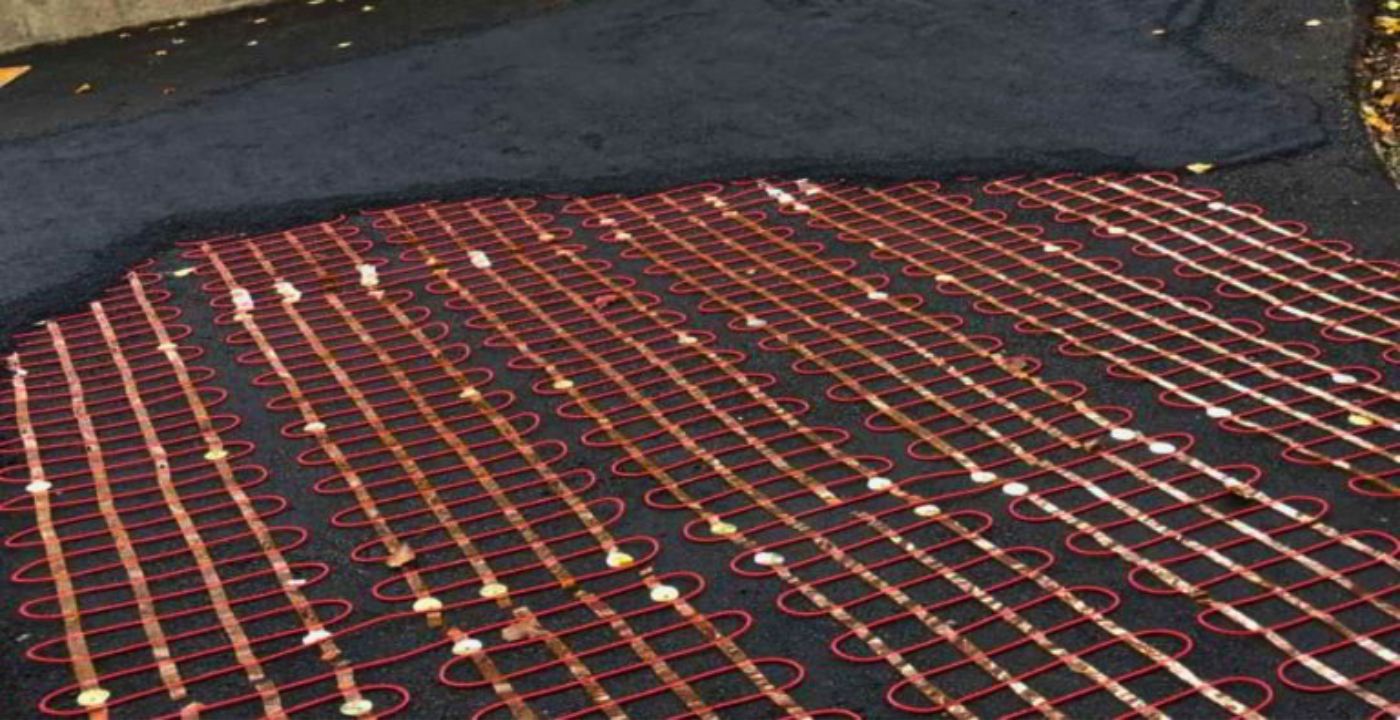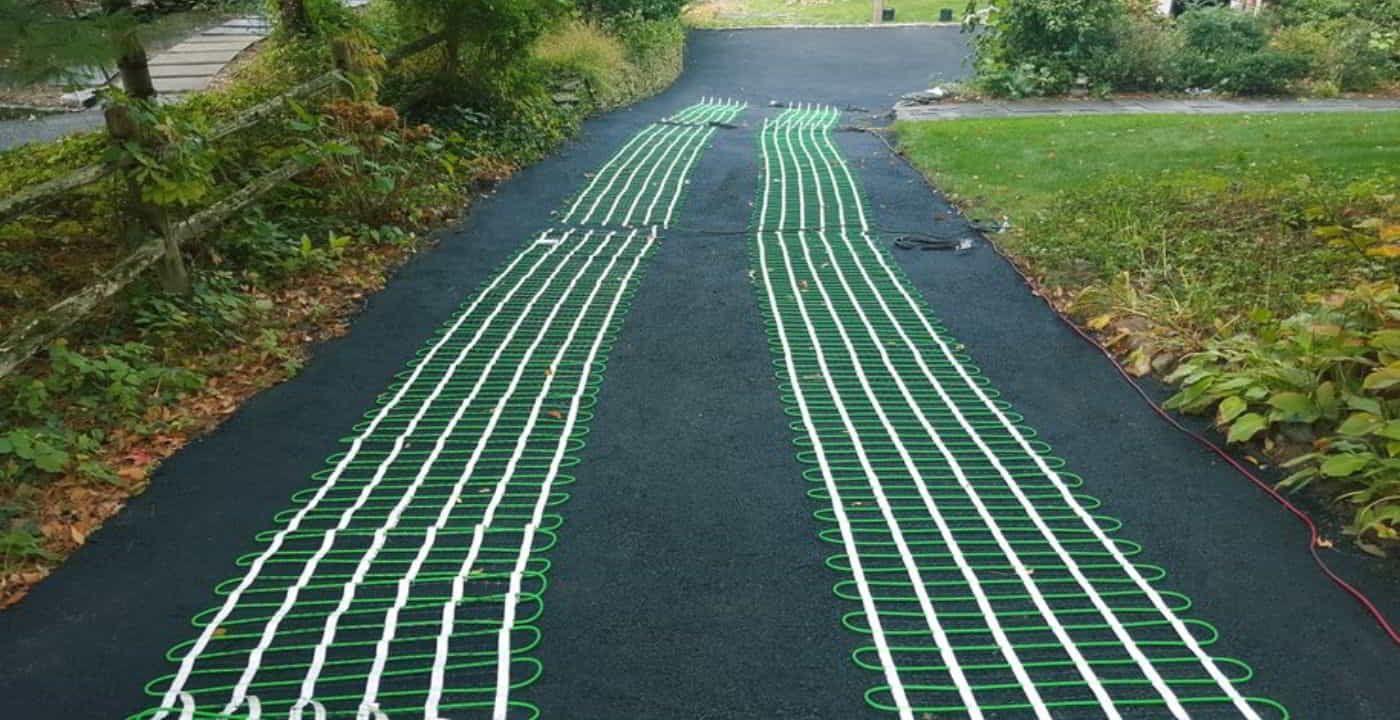In this article, we will delve into the advantages and disadvantages of heated driveways, analyzing factors such as cost, efficiency, and environmental impact to answer the burning question: Are heated driveways worth it?
Key Takeaways
- Heated driveways convey a wide range of benefits from accident reduction and increasing the lifespan of the driveway to environmental benefits and increased property values.
- Both the initial installation and any repairs can be long and disruptive.
- While the value of investing in heated driveways is a matter of personal opinion, few who install them regret the decision.
The Advantages of Heated Driveways

Convenience and Time-Saving Benefits
A major advantage of heated driveways is the convenience they offer.
They eliminate the need for manual snow removal, saving homeowners time and physical effort. This is particularly beneficial for those with health issues or busy schedules.
Safety and Accident Prevention
Heated driveways enhance safety by preventing the accumulation of snow and ice, which are common causes of slips and falls.
This is especially important in households with elderly members or young children.
Longevity and Maintenance of Driveway Surfaces
Heated driveways can increase the lifespan of the driveway surface. By preventing the freeze-thaw cycle, they reduce the risk of cracks and potholes, leading to lower maintenance costs over time.
Environmental and Wildlife Benefits
Compared to traditional deicing methods like salt or chemical deicers, heated driveways are more environmentally friendly.
They reduce the runoff of harmful chemicals into local ecosystems, protecting plants and wildlife.
Comfort
Radiant heat is just like the heat from the sun and is much more comfortable than forced air heating systems.
The even distribution of heat from the ground up ensures a comfortable, equal living environment, eliminating cold spots and drafts often associated with conventional heating systems.
Health Benefits
For homeowners, particularly those with health issues or physical limitations, a heated driveway eliminates the strenuous and sometimes risky task of shoveling snow, reducing the chance of overexertion.
Environmental Impact
Traditional methods of ice melting often involve salt or chemicals that can be harmful to the environment and wildlife.
Heated driveways reduce the need for these substances, leading to less runoff into local ecosystems.
Increased Property Value
A heated driveway can be a selling point for potential buyers.
While the exact impact on property value can vary, a heated driveway is often perceived as a luxury amenity, potentially increasing the overall value of your property.
Aesthetic Maintenance
The constant cycle of freezing and thawing can damage the driveway’s surface, leading to cracks and potholes.
A heated driveway maintains a more consistent temperature, helping preserve the driveway’s aesthetic and structural integrity.
Compatibility with Renewable Energy Sources
For electric heated driveways, there is an opportunity to integrate with solar panels and other renewable energy sources, allowing for more sustainable and potential cost savings.
The Disadvantages of Electric Underfloor Heating

High Upfront Installation Costs
One of the primary drawbacks of heated driveways is their high installation cost.
This includes the cost of materials and labor, which can be substantial depending on the driveway size and system type.
Increased Utility Bills
Operating a heated driveway leads to higher utility bills. Electric systems, in particular, can significantly increase electricity consumption during winter months.
Potential Maintenance and Repair Expenses
While generally reliable, heated driveways can incur maintenance and repair costs.
Components like heating elements or boilers may require servicing or replacement over time.
Heated Driveway Pros and Cons Table
| Pros | Cons |
|---|---|
| Convenience and time-saving | High upfront installation costs |
| Safety and accident prevention | Increased utility bills |
| Driveway surface longevity | Potential maintenance and repair costs |
| Environmentally friendly | |
| Increased property value | |
| Reduced physical strain | |
| Prevention of overexertion | |
| Preserving driveway appearance | |
| Compatibility with renewable energy |
Installation Insights
Process of Installing Heated Driveways
The installation process involves laying heating cables or pipes beneath the driveway surface, connected to a power source or boiler.
It often requires professional installation and can be both time-consuming and disruptive.
Time and Effort Required
Installation time varies based on the system and driveway size. It can range from a few days to a couple of weeks.
Planning and preparation are essential for a smooth installation process.
Choosing the Right System
Selecting the right system depends on individual needs and preferences. Factors like climate, driveway size, and budget play a crucial role in this decision.
Maintenance and Longevity
Regular Maintenance Requirements
Maintenance for heated driveways includes checking system components and ensuring efficient operation.
Regular inspections can prevent major issues and extend the system’s life.
Lifespan of Heated Driveway Systems
The lifespan of a heated driveway system depends on the type and quality of installation. On average, these systems can last anywhere from 15 to 30 years with proper maintenance.
Alternatives to Traditional Heated Driveways
Emerging alternatives like above-ground heating mats offer a less invasive option.
These mats can be placed on the driveway surface and removed when not needed, offering flexibility and ease of use.
FAQs
What is the Life Expectancy of a Heated Driveway?
The average lifespan ranges from 15 to 30 years, depending on the system type and maintenance.
Electrical systems tend to last longer because they have fewer components that can break down and require much less maintenance than hydronic systems.
What is the Average Cost of Installing a Heated Driveway?
Installation costs vary widely but can range from $12 to $50 per square foot, depending on various factors.
For above-ground heating mats, you can expect to pay somewhere between $800-$2000 with professional installation adding to that cost.
Are Heated Driveways Worth It?
Heated driveways are a fantastic addition to any home. What’s not to like?
They save you time, stop you from having to labor in the cold, and prevent slips and falls. They also help to preserve your driveway and extend its lifespan, while at the same time being better for the environment, pets and local wildlife than many of the alternative deicing options that you could choose.
That’s quite a return on investment.
If the initial purchase price and additional costs to your monthly electricity bill are acceptable, then the odds are good that you will be counting your heated driveway as a worthy investment for many years to come.
If you would like to discuss the best options for adding a heated driveway to your home, get in touch today.





